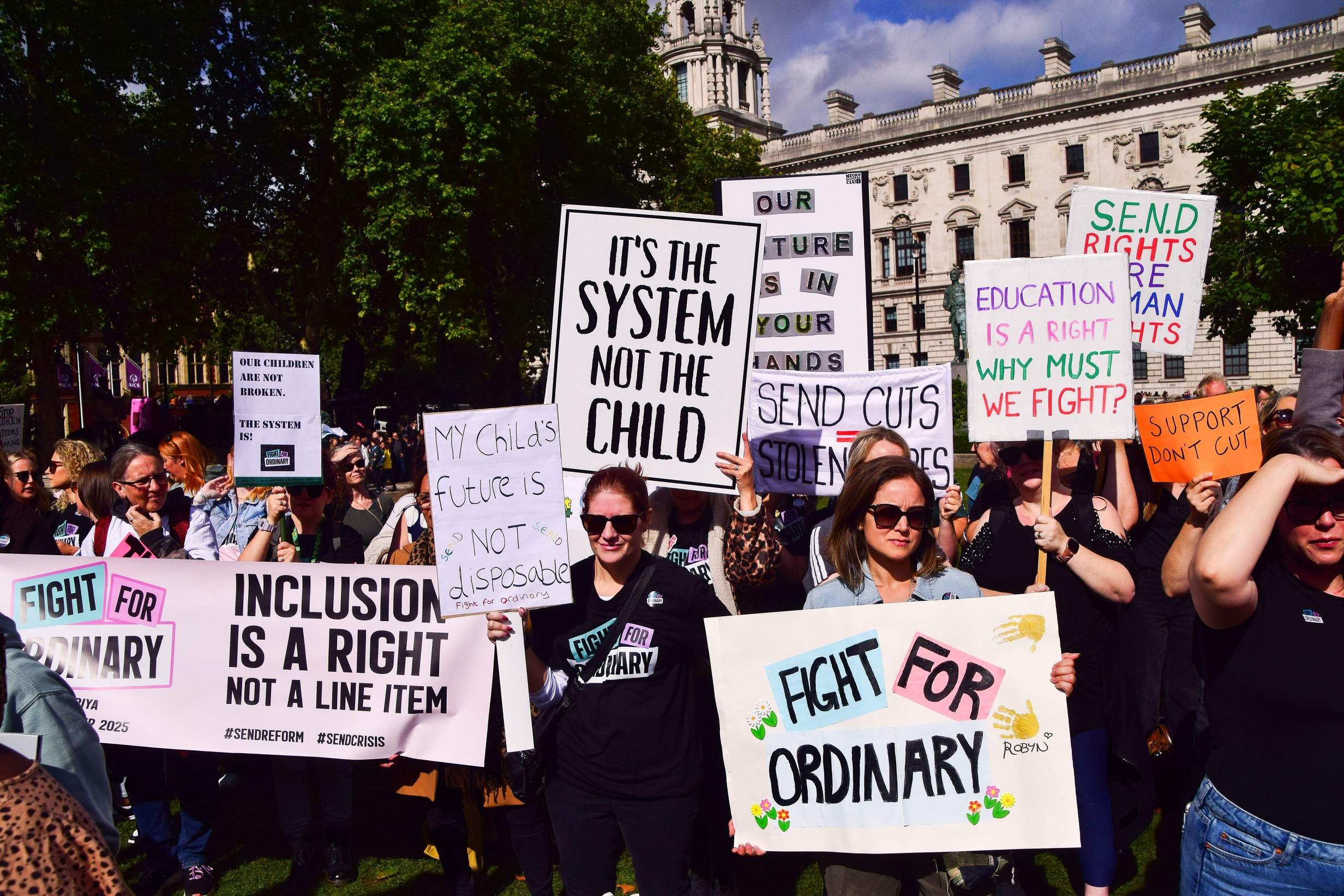
Read our Monthly Magazine
And support our mission to provide fearless stories about and outside the media system
In the lead-up to what promises to be a consequential budget, the money spent on supporting disabled people is constantly questioned, often in the most simplistic terms.
Thus, to the glee of right-wing politicians and journalists, the National Audit Office has recently reported that local authorities spend £2 billion every year on transporting disabled children to school.
Meanwhile, the reform of the SEND (Special Educational Needs and Disabilities) system is endlessly postponed, no doubt because of the political challenge involved in cutting services.
And all the time, welfare benefits are eyed greedily, and recipients are challenged to prove that they are ‘disabled enough’ to deserve them.
As so often in times of economic crisis, the weakest get hit the hardest.
Those of us who champion the rights and dignities of disabled people, especially those with learning disabilities, tend to avoid talking about money.
We know from bitter experience that learning disabled people are all too often presented as imposing an unsupportable ‘burden’ on society. We remember that the Nazis showed us where such rhetoric leads, and answer that our loved ones have all kinds of value which cannot be measured in monetary terms.
But, while our silence is understandable, we should, I believe, insist that the financial calculations are more complex. Maybe, just maybe, it is time to follow the money.
The stubborn fact is that the education, healthcare, and social support of people with learning disabilities is relatively expensive.
Young people like my 29-year-old son Joey need a level of one-to-one support that few his age require. The problem is that the conversation is always conducted in such simplistic terms: it is as if learning disabled people represent an absolute financial loss, to be contrasted with their non-disabled peers, who cost the taxpayer nothing at all.
We need to offer a more nuanced perspective.
Thus, every time we hear mutterings about the bill for children with special education needs, we should insist on subtracting the amount spent (around £8,000 per year) on educating a non-disabled child.
Whenever we read about the money spent by the NHS on people with chronic disabilities, we should subtract the costs of the healthcare of their non-disabled brothers and sisters.
Each time we are warned of the rising bill for the social care of disabled people, let us balance that with the cost of other benefits that most people draw on at some time in their lives.
Yes, supporting people with learning disabilities costs money – but we should be more precise about what we are measuring that against.
We should also factor in the costs of those activities incurred by non-disabled people which tend not to be needed by learning disabled ones: driving on roads and motorways, using public transport, attending college and university, accessing subsidised arts and leisure facilities, even working in the public sector.
The truth is that the simpler, more modest, lives generally led by learning disabled people impose simpler, more modest costs.
Behind all of this lurks a grim but significant statistic: the median life expectancy for a (white) man with learning disabilities is 63, compared with 81 for the general population. There are many reasons for this unwarranted ‘social murder’, as Sara Ryan calls it in her terrific new book Critical Health and Learning Disabilities: An Exploration of Erasure and Social Murder.
But the dreadful consequence is that the vast majority of people with learning disabilities will never draw a state pension, receive winter fuel allowance, or travel benefits, let alone incur any of the considerable costs incurred in health and social care by an ageing population. The brutal fact is that short lives cost the state less money.
It is not as if families don’t spend enough. Many parents of disabled children are forced to give up work, and marital break-up, depression and mental illness are all too common. What’s more, as Scope’s Disability Price Tag indicates, disabled families have to find on average an additional £1,095 per month to achieve the same standard of living as non-disabled ones. The state’s support is hardly keeping disabled people in luxury.
Then we should consider how public money is being spent.
Most costs are borne by cash-strapped local authorities, on education, housing, and social care. But is all this expenditure inevitable, and how much is the result of structural bad design and underlying inefficiencies?
It is extraordinary how much goes on managing the system. Thus, by a recent reckoning, local authorities spend about £60 million a year fighting parents of disabled children in SEND tribunals, the vast majority of which find in favour of the parents. It is a significant waste of money, only possible in a society which fails to put the needs of the child first.
Or look at the increasing refusal by local authorities to provide transport to schools for disabled 16-to-18 year olds. Journalists and politicians, perhaps understandably, harrumph over the huge costs of putting young people into taxis, often with chaperones – but nobody seems to remember the infinitely cheaper local authority-run buses which used to take children like my Joey to school in groups.
ENJOYING THIS ARTICLE? HELP US TO PRODUCE MORE
Receive the monthly Byline Times newspaper and help to support fearless, independent journalism that breaks stories, shapes the agenda and holds power to account.
We’re not funded by a billionaire oligarch or an offshore hedge-fund. We rely on our readers to fund our journalism. If you like what we do, please subscribe.
These were presumably abandoned under the drive towards privatisation and outsourcing, with the consequence that families make increasingly large sacrifices simply so their disabled children can enjoy the same rights to an education as their non-disabled siblings.
In recent months, it has been argued that scrapping Education, Health and Care Plans (EHCPs) will somehow save money. But this is just shooting the messenger: the EHCPs are a useful diagnostic tool which specify what help a child or young person requires in order to have the best possible chance in life. They could certainly be streamlined and made nimbler: indeed, a more person-centred approach could help reduce the costs that come with assuming that all children with the same diagnosis have the same needs.
There is some evidence that parents with greater social capital have an easier time securing support, but the claim that an EHCP is a ‘golden ticket’ to an easy life is as absurd as it is offensive. If society wants to save money, it needs to have an honest conversation about what it is prepared to spend and avoid the expensive diversion of frankly superficial and counter-productive reforms.
Finally, we should consider the role of private finance in the highly profitable network of independent special schools, academy trusts, and residential care settings, with senior management, property developers, and shareholders all benefitting handsomely from the huge fees that they can charge local authorities.
In other words, if we are worried about why the costs of looking after learning disabled people has ballooned in recent decades, we should stop being so binary in our calculations and become more transparent about where the money is being spent.
What we certainly should not do is blame learning disabled people, their families, and their allies. They have got enough on their plate without being told that their loved ones aren’t worth the money.
Stephen Unwin is the author of ‘Beautiful Lives: How We Got Learning Disabilities So Wrong’
